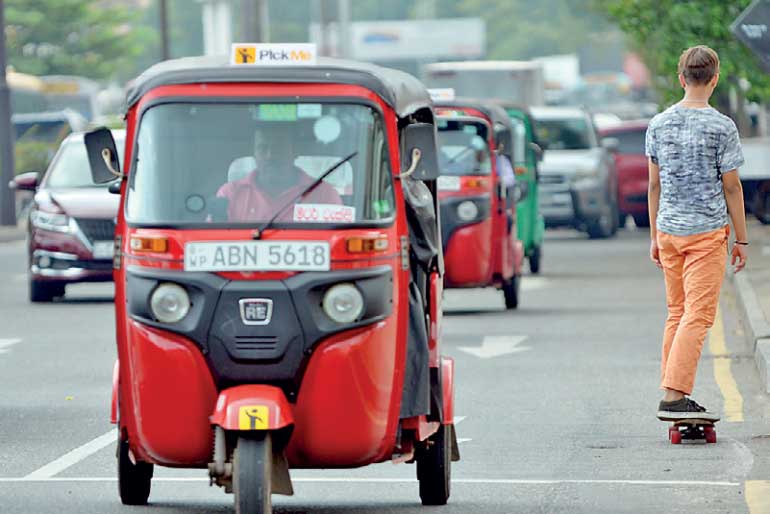Tuesday Feb 17, 2026
Tuesday Feb 17, 2026
Tuesday, 1 March 2022 02:01 - - {{hitsCtrl.values.hits}}

A tourist here soon develops a bunker mentality. If he moves outside of his hotel, the three-wheelers, touts, trinket sellers and beach boys besiege him – Pic by Shehan Gunasekara
It was during a recent weekend holiday at a resort hotel in the south of Sri Lanka that I met Gertrude. Slim, tallish and sunburnt, a woman who had spent long years in the tropics. She was busy in a cheerful way; walking about, talking to hotel staff, answering mobile telephone calls, taking notes; clearly, she was working. During lunch we sat at adjoining tables and exchanged some pleasantries. I learnt that she was a tour guide accompanying a small group of German hoteliers who were on an exploratory trip to the country. Her lunch was light, a bowl of soup followed by some tropical fruits.
In the afternoon I was on the broad promenade of the hotel admiring the setting sun when Gertrude walked by. She had a book in her hand, Somerset Maugham’s “Cakes and Ale”. Maugham is an author I have read with much pleasure. This common interest led to a long chat, we ordered tea, discussed many things. Gertrude was well-informed about Sri Lanka. “This place is so full of gossip,” she laughed. I inquired about the state of our tourist industry.
“Considering the potential this country has, the development of tourism has been disappointing. Making quick money seems to be the purpose, not developing sustainable systems. Then I suppose one can say this of almost every other activity in this country!”
I asked her whether she could specify the problems confronting the industry.
“There are so many issues, they overlap and sometimes even contradict. Professionalism and attitude are important in a service industry. To deliver a service that meets customer expectations is fundamental. Some people equate service with humbleness. Poor quality service cannot be overlooked merely because of abject apologies. The customer is paying good money. Being humble may be a good quality, to be ingratiating however is demeaning.”
Although humour was intended, there was no mistaking the disenchantment in her words. “The tourist makes friends with a local at his peril. After the ice is broken, the somewhat bewildered white man is invited to ‘our’ home. It is ‘our cultural openness’, the man is most insistent. When the tourist finally relents, the local guy will be transformed into a dynamo. In no time a three-wheeler will appear, the driver grinning widely. Sometimes even a King Coconut is offered. Inevitably another, a curious on-looker will also jump into the three-wheeler for the ride to the village.
“On they go on a crowded rutty road to the man’s home where the tourist will be introduced to several women and children. At the end of the hospitality the man will describe how a coconut fell on the head of his father-in-law who now has to be cared for by him. The tourist will soon catch the drift of the whole thing and donate about a hundred dollars. They will then bid him goodbye suggesting hopefully that he pays them another visit.” She laughed in an annoyed way, “You, tell me, how many tourists would enjoy this kind of experience?”
Gertrude had first come to Sri Lanka in the 1980s, a young German tourist exploring the world, and stayed on as a tour guide for European tourists. “I fell in love with this green soft land. That time you had only the Inter-Continental in Colombo purpose-built for tourism, soon after the Oberoi Hotel came up. Outside of Colombo we used to stay at rest houses, cockroach and rat-infested. The bathrooms were grimy and leaky. But I thought it was different, kind of exciting. As a tour guide, I used to telephone ahead and order our meals. Some in the group wanted Italian, others just salads or soups. In those days, things like fresh milk, toilet paper and maps were difficult to find. The inn-keepers took any meal order; they did not see a problem in meeting them! Needless to say, the food was not anything like what the tourist was expecting! In Europe, we have a lot of cultural tourists wanting to experience something different; even the decrepit, sub-standard or the inefficient, can be an experience!”
“Soon after I started doing tours, the horrible events of the JVP insurrection occurred. That destroyed the tourist industry for a few years. This was followed by the LTTE terrorism which went on interminably.”
For three decades she had worked with the chaotic system, striving to provide an orderly holiday for her tourists. Now in semi-retirement she does consultancies for tour groups in South East Asia, mainly during the European winters.
“A tourist here soon develops a bunker mentality. If he moves outside of his hotel, the three-wheelers, touts, trinket sellers and beach boys besiege him. In any event, there is little he can do outside the hotel even in a place like Colombo. Shopping, in comparison to places like Singapore, Kuala Lumpur or Bangkok is pretty basic. Most shops in Colombo are drab and limited. One must admit that entertainment in Colombo is very much 1970s. We have the zoo, the museum and maybe the Independence Square. It is very difficult to even find parking in these areas. For sports and outdoor activity what do we have? There is only one golf course in the whole of Colombo District, for that matter in the entire Western Province. In Pattaya (Thailand) alone there are more than a dozen golf courses; in addition, there are several driving ranges. I don’t know how tourism of high value can be developed, when everything else is so inhibiting.”
“I was in Bali recently. During the day we spent time at the beaches, markets, eateries, etc. Every evening we took the group to dinner to outside restaurants. They were very good. They had Mexican, Thai, Russian and the last night we went to an Irish pub. No one ever bothered us. The per capita income of Indonesia is comparable to Sri Lanka. But the attitudes are different. There is no pleading or begging mentality. The three-wheelers don’t slow down hopefully when they see a white man. You don’t get that harassed feeling when walking the streets. “Having worked in the industry for three decades now, I can say there are very few people in this country who understand the industry. They look at it as an opportunity to make quick money, over-pricing for an average service. Tourism is a service industry, starting from providing accurate pre-tour information. Often when you arrive at the hotel even your booking is not certain, handled clumsily. It is sad to listen to all the speeches and see the money spent on promoting the industry, going nowhere. Maldives earns more than Sri Lanka from tourism.”
Having spent most of her adult life in Sri Lanka, Gertrude cannot conceive of a life away from the sun and the sands. To give up the excitement of travel, meeting new tour groups, hotel experiences and the largely outdoor lifestyle, for the impersonal efficiencies of her own land is inconceivable to her now. If things were to get intolerable, there is always the comfort of knowing that escape is only a flight away from Katunayake. For those living here, no such convenient departure is possible. Their lives and aspirations are permanently tied to the land.
“I feel so frustrated because Sri Lanka, both geographically as well as culturally, has much to offer. By South Asian standards Colombo is a clean city. Your beaches are attractive. There is a reasonable amount of diversity within the country. However, nothing can work until the dominant species in the land; the humans, do something about it!”
I asked Gertrude what has to be done to change things around.
“You will be surprised to learn of the difficulties the tourists have finding a clean washroom. What they have in the average establishment, like small restaurants and shops are bad, dank and stinking. You must drive into a five-star hotel to find a tolerable toilet. How many such places do you find in the country?”
“Recently, some walking tracks were created in the hill country, I think with the assistance of the EU and USAID. This, in the planning for a long time, is a good idea. I don’t know why the various local governments had not thought of this before. It is in the interest of the local populations to create such activity, to make the tourist spend time in the locality. The tourism authority cannot attend to everything. It is seldom you see any initiative on the part of the local authorities. They must clean up their area, create opportunities.”
“The main thing is the attitude. Like all businesses, in tourism too, there must be a serious and honest intent. For example, in some establishments here, they insist on a dress code; ties, shoes, no casual shirts, etc. This is good. In our culture, such dress codes speak of a serious commitment. Here, they may wear a tie yet come very late for meetings or are unprepared or do not follow up promptly. The formal dress is just an empty pose, a kind of gimmick to create an impression, and only that.”